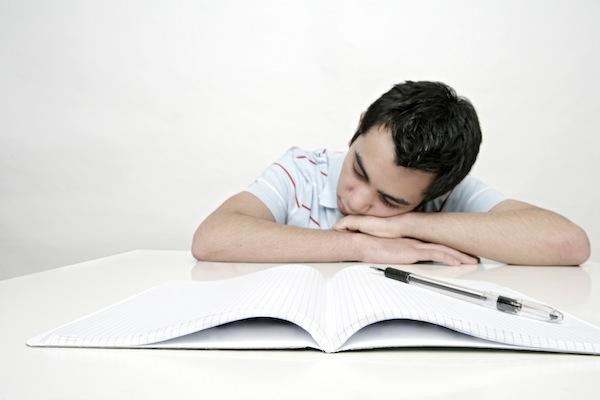
 Parenting teenagers is no easy feat. You worry about drugs, grades, sports, sex, college acceptance, peer pressure, bullying… there’s probably not much you don’t worry about.
Parenting teenagers is no easy feat. You worry about drugs, grades, sports, sex, college acceptance, peer pressure, bullying… there’s probably not much you don’t worry about.
Yet, there’s one thing you may not be concerned about that could make an impact on all the things listed above. Sleep.
According to psychologist and author JoAnne Deak, the sleep needs of teenagers are incredibly unique. “During adolescence, surges of hormones have an amphetamine type effect on the pineal gland of the brain, a tiny, little pea-sized gland that produces melatonin and causes you to be drowsy. As you move into adolescence with these surges of hormones, the pineal gland is actually suppressed for a couple of hours. So adolescents can't fall into that “good” sleep until about 11:00 p.m. or midnight. All the research shows that because of the huge growth going on, they need to be able to sleep about nine hours.”
The problem is, of course, that the majority of middle and high schools start earlier than 8am, meaning that there’s no real way for a teen to get sufficient sleep on that schedule. The National Sleep Foundation lists the deleterious effects of insufficient sleep on teens, which include depression, acne, aggressive behavior, cognitive problems, and learning difficulties.
“I think children aren't getting enough sleep. I think our lives have become hectic, our commutes longer, our working hours and days longer. And I think the time we spend on other things deprives us of the time at home to really rest our bodies,” says Reveta Bowers, Head of School at The Center for Early Education, an urban Los Angeles independent school. “We're seeing way too many children come to school tired because they haven't had enough sleep and they've been over-stimulated at home.”
Deak has similar concerns. “No adolescent should be made to wake up before 9:00 a.m. The problem is, the whole world's designed around early wake up and drop off. Any time you wake up a teenager before 9:00 a.m., you are going against their neurobiological clock, and you will have a hard time doing it.” Along with other experts, Deak is trying to encourage schools to consider the reality of how much sleep teenagers need. “We want schools to start later. Those districts that have done that show significant impacts in terms of standardized test scores, letter grades, attendance at school, attention in class, and attitude at school. Every school that has done this has reported significant positive changes in that direction. Schools that don't, report that getting adolescents to pay attention and think in first and second periods in class is almost impossible. They have to use extraordinary techniques. That change in starting time really solves many of the issues that we are seeing.”
 Unfortunately, most school districts have not heeded this advice. So what can you do, as a parent, to mitigate the effects of poor sleep in your teen? Michael Bradley, a psychologist and author, has an interesting suggestion: bribery.
Unfortunately, most school districts have not heeded this advice. So what can you do, as a parent, to mitigate the effects of poor sleep in your teen? Michael Bradley, a psychologist and author, has an interesting suggestion: bribery.
“What does not work is telling them ‘go to bed,’ because they're wired by Mother Nature to stay awake,” he explains. So what does work? “Get their cooperation. You have to work as a team. A good way to do that is to bribe them. Say, ‘I will pay you to work on a program for a month. I'll put you on minimum wage to sleep...at least eight or nine hours a night. How about that for a deal?’ If the kid agrees, you agree to a contract where she agrees to keep a log where she records how she feels on a scale of 1 to 10, how homework is going, how test scores are going, what her mood is like, and you're going to do this for a month.”
Bradley warns that this will be easier said than done, and will require some lifestyle changes. He recommends turning off all screens and encouraging reading an hour before bed; only using the bed for sleep; putting clocks out of sight; and eating sleep-inducing foods like carbohydrates and turkey. “Your kid will struggle for a week and then suddenly her sleep clock will start to kick in. And on her own, she'll start to get sleepy, say 9 or 10 o'clock at night. And there's magic.”
Bowers also urges parents to prioritize sleep over homework, provided the deadline allows for a little flexibility. “I would encourage parents to say to children who are up to all hours doing homework, you know what? It would be better if you stopped, got some sleep. It will be clearer and so much easier to do the next day than it is when you're tired.”
Getting teens to sleep might not be easy, but it’s worth the struggle. Give it a few months, and your child will be happier, healthier and more capable of handling the unavoidable stress of being a teenager.
*Originally published on HuffPost Parents







my teen loves to sleep and i let them sleep in on weekends because they are so stressed with all their actvities throughout the week. i have found it helps them perform better throughout the week if they can catch up an any lost sleep on the weekends. it's not the best schedule but we take what we have to work with right now.
It's important to make sure they are not sleeping their life away. And if they are sleeping a lot it could be a sign of depression.
I also would encourage that everything is turned off at least 30 minutes before bed. This will help them relax and will also encourage them to do things like read.